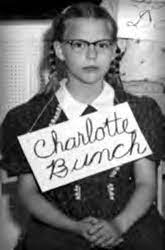In 1972, author Charlotte Bunch articulated lesbianism was a political choice that fundamentally threatened male supremacy by challenging the idea that men were crucial to the existence of women. In her essay “Lesbians in Revolt,” she develops lesbianism as a way to identify women relative to other women, as opposed to defining them relative to their male counterparts. This “woman-identified woman” would be one that commits herself to other women politically, emotionally, physically, and economically.
